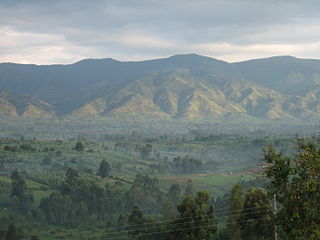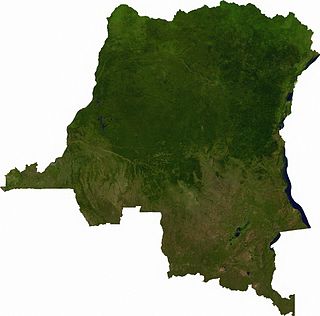
Politics of the Democratic Republic of Congo take place in the framework of a republic in transition from a civil war to a semi-presidential republic.

The Democratic Republic of the Congo, also known as the DR Congo, the DRC, or Congo-Kinshasa, is a country in Central Africa. By land area the Congo is the second-largest country in Africa and the 11th-largest in the world. With a population of around 109 million, the Democratic Republic of the Congo is the most populous Francophone country in the world. The national capital and largest city is Kinshasa, which is also the economic center. The country is bordered by the Republic of the Congo, Central African Republic, South Sudan, Uganda, Rwanda, Burundi, Tanzania, Zambia, Angola, the Cabinda exclave of Angola, and the South Atlantic Ocean.

North Kivu is a province bordering Lake Kivu in the eastern Democratic Republic of the Congo. Its capital is Goma. The 2020 population was estimated to be 8,147,400.

South Kivu is one of 26 provinces of the Democratic Republic of the Congo (DRC). Its capital is Bukavu.

Bukavu is a city in eastern Democratic Republic of the Congo (DRC), lying at the extreme south-western edge of Lake Kivu, west of Cyangugu in Rwanda, and separated from it by the outlet of the Ruzizi River. It is the capital of the South Kivu Province and as of 2012 it had an estimated population of 806,940.

The national emblem of the Democratic Republic of the Congo has changed several times since 1997. The current one was introduced in 2006 and depicts a leopard head, surrounded by an elephant tusk to the left and a spear to the right. Below are the three words which make up the national motto: Justice, Paix, Travail. It was adopted on 18 February 2006 by President Joseph Kabila.

Article 2 of the Constitution of the Democratic Republic of the Congo divides the country into the capital city of Kinshasa and 25 named provinces. It also gives the capital the status of a province. Therefore, in many contexts Kinshasa is regarded as the 26th province.

Azarias Ruberwa Manywa is a Congolese politician, lawyer, and public figure. During the Second Congo War he was Secretary-General of the Rassemblement Congolais pour la Démocratie (RCD-G) rebel group. Following the war, he was one of the vice-presidents in the transitional government of the Democratic Republic of the Congo between 2003-2006. He has also been the leader and president of RCD-G's political party since 2003. He is a member of the Banyamulenge community of South Kivu who belong to the Tutsi ethnic group.

Articles related to the Democratic Republic of the Congo include:

Vital Kamerhe Lwa Kanyiginyi Nkingi is a Congolese politician, currently serving as Deputy Prime Minister of Economy and the leader of the Union for the Congolese Nation (UNC) party. He served as the President of the National Assembly of the Democratic Republic of the Congo from 2006 to 2009. After resigning from that office, he went into the opposition and founded the UNC. He ran in the 2011 presidential election. He supported Félix Tshisekedi as a coalition partner in the 2018 presidential election, and became chief of staff when Tshisekedi took office.

The Kivu conflict is an umbrella term for a series of protracted armed conflicts in the North Kivu and South Kivu provinces in the eastern Democratic Republic of the Congo which have occurred since the end of the Second Congo War. Including neighboring Ituri province, there are more than 120 different armed groups active in the eastern Democratic Republic of Congo. Currently, some of the most active rebel groups include the Allied Democratic Forces, the Cooperative for the Development of the Congo, the March 23 Movement, and many local Mai Mai militias. In addition to rebel groups and the governmental FARDC troops, a number of national and international organizations have intervened militarily in the conflict, including the United Nations force known as MONUSCO, and an East African Community regional force.

In areas of the Democratic Republic of the Congo, the human rights record has remained considerably poor, and serious abuses have been committed. Unlawful killings, disappearances, torture, rape, and arbitrary arrest and detention by security forces increased during the year, and the transitional government took few actions to punish harsh people. Harsh and life-threatening conditions in prison and detention facilities; prolonged pretrial detention; lack of an independent and effective judiciary; and arbitrary interference with privacy, family, and home also remained serious problems. Security forces continued to recruit and retain child soldiers and to compel forced labour by adults and children.
Laurent Nkunda is a former General in the Armed Forces of the Democratic Republic of Congo (DRC) and is the former warlord operating in the province of North-Kivu, and a officer of the Tutsi-dominated government of neighbouring Rwanda. Nkunda, who is himself a Congolese born Tutsi, commanded the former DRC troops of the 81st and 83rd Brigades of the DRC Army. He speaks English, French, Swahili, Kinyarwanda, Lingala and Kinande. On January 22, 2009, he was put under house arrest in Gisenyi when he was called for a meeting to plan a joint operation between the Congolese and Rwandan militaries.
John Numbi is a Congolese former security officer and retainer of Joseph Kabila, who rose to the rank of General. Until January 2010, he was the Inspector General of the Congolese National Police. In 2018 he was appointed as the Inspector General of the Armed Forces of the Democratic Republic of the Congo (FARDC). He was replaced in that role in 2020, and fled the DR Congo after Joseph Kabila's power dwindled in the first quarter of 2021.
The Congolese Rally for Democracy–Goma was a faction of the Congolese Rally for Democracy, a rebel movement based in Goma, Democratic Republic of the Congo (DRC) during the Second Congo War (1998–2003). After the war, some members of the group continued sporadic fighting in North Kivu. The movement also entered mainstream politics, participating in democratic elections with little success.
The following lists events that happened during 2012 in the Democratic Republic of the Congo.
Bestine Kazadi Ditabala,, is a Congolese writer.
The following is a timeline of the history of the city of Goma, Democratic Republic of the Congo.
Léon Mamboleo Mughuba was born in December 1936 in Kagozi in Mwenga. He is a politician from the Democratic Republic of the Congo, former minister in several national governments since 1960. He was the interim president of the senate after his election in 2018, and currently sits as a Senator.
Events in the year 2021 in the Republic of the Congo.